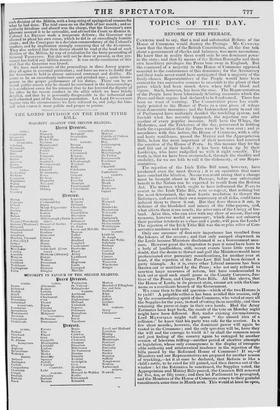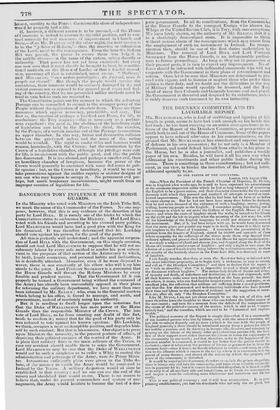TOPICS OF THE DAY.
REFORM OF THE PEERAGE.
CANNING used to say, that a real and substantial Reform of the House of Commons would destroy the Peerage. Mr. CANNING knew that the theory of the British Constitution, all the fine talk about a government of checks and balances, was mere moonshine. He knew that in reality there could only be one dominant power in the state ; and that by means of the Rotten Boroughs and their own hereditary privileges the Peers bore sway in England. But the command of a majority in the House of Commons appeared
essential to the continuance of this dominion; for the Aristocracy and their tools never could have anticipated that a majority of the freely-chosen Representatives of the People would have been content for two successive sessions to succumb to the ghost of that power which had been struck down when full of blood and vigour. Such, however, has been the case. The Representatives of the People have been laboriously debating measures which the Peers and their organs had declared to be foredoomed. There has been no want of warning. The Conservative press has exult- ingly pointed to the House of Peers as a sure place of refuge from democratic measures; and the Independent party in and out of Parliament have uniformly derided the truckling system, and foretold what has recently happened, the rejection one after another of every popular measure. Still have the 'Whigs, the Moderates, and the Tricksters of the day, persevered in holding forth the expectation that the Peers were to be won over ; and ill accordance with this notion, the House of Commons, with a silly and hasty confidence, passed the 'Unfitly and the Appropriation Bills, btfore the most important of their measures had received the sanction of the House of Peers. In this manner they let the staff fall out of their hands : it has been taken up by their Lordships, who have cudgelled us with it right soundly. The truth is, that we have been overreached, through the timidity and credulity, for we are loth to call it the dishonesty, of our Repre- sentatives.
The rejection of the Irish Tithe Bill must, however, have awakened even the most drowsy ; it is an operation that must have couched the blindest. No one can avoid seeing that a change must be brought about in the Peerage, before any substantial benefit to the Nation can be expected to result from the Reform.
Act. The motives which ought to have influenced the Peers to assent to the Irish Tithe Bill, were so cogent, that nothing but the most determined, the most frantic resolution to thwart the
Reformers, and assert their own supremacy- at all risks, could have induced them to throw it out. But they hare thrown it out, in defiance of the bloodshed and misery of the tithe-payers, and,
what affects them more nearly, the utter ruin of the Clergy of Ire- land. After this, who can aver with any show of reason, that any measure, however useful or necessary, which does not subserve
their peculiar interests as a class and a party, will pass the Lords ? The rejection of the Irish Tithe Bill was the ne plus ultra of Con- servative madness and spite.
Only one measure of first-rate importance has resulted from the labours of the session ; and that only escaped shipwreck in the Lords because Ministers disclaimed it as a Government mea- sure. However great the temptation to pass it must have been to a body of landholders, still, recent events leave little room to doubt, that the desire to thwart and gall the Ministers would have predominated over pecuniary considerations, for another year at least, if the rejection of the Poor-Law Bill had been deemed a party triumph. As it is, every other Liberal measure has been thrown out or mutilated by the Peers ; who not only refused to sanction large measures of reform, but have condescended to kick out or spoil such small game as the County Coroners, Jus- tices of the Peace, and Cinque Ports Bills. All this shows, that the House of Lords, in its present state, cannot act with the Com- mons as a coordinate branch of the Government.
'We come then to the old question—which of the two Houses is to yield? A palpable collision has been avoided this session, only by the accommodating spirit of the Commons, who voted at once all the Supplies for the year, instead of voting them monthly-, and thus retaining the purse-strings in their own hands. Had the Army Estimates been kept back, the result of the vote on Monday night might have been different. But, under existing circumstances, Lord MANSFIELD might well spurn " the absurd idea of a collision :" he knew that his party was safe for the session. In a few short months, however, the dominant power will again be vested in the Commons ; and the only question will be, have they the will and the courage to wield it? or shall the common sense and just feeling of the country again be outraged by another session of laborious trifling—another period of abortive attempts at legislation, whose only consequence is the display of irrespon- sible authority and aristocratical insolence in the rejection of the bills passed by the Reformed House of Commons? If so,—if Ministers and our Representatives are prepared for another season of truckling,—let it at once be declared, that Reform is like a child's rattle, to be cried for till gained, and then thrown out of the window : let the Estimates be sanctioned, the Supplies voted, the Appropriation and Mutiny Bills passed, the Coercion Bill renewed for five, ten, or fifty years ; and then let Parliament be prorogued, and the Members of the house of Commons return to their grateful constituents some time in March next. This would at least be open,
Isesest, servility to the Peers : the miserable show of independence Wou'd be properly laid aside.
If; however, a different course is to be pursued,—if the House of Commons is indeed to assume its rightful position, and to con- tend seriously for real measures of improvement in Church and State,—if, as Mr. II t ItVEY said the other night, the next session is to be the "jubilee of Reform,"—then the coercion or submission of the Lords must be the consequence. From the hour the Reform Bill was passed, the power to coerce them was lodgsd in the middle elnsses—:n the mass of the nation, acting directly or indirectly. That power has not yet been exercised; but every one now sees that it must shostiv be brought to bear, by constitu- tional methods, on the Hou: e of Lords; or that a ftetifttl convul- sion, upsetting all that is established, must ensue. " Malheur," said MIRAHE A IT, "aux ordres pririblgies ; ils finiront, mats le peaple est eternel." But though the 'people would survive the convulsion, their interests would be seriously damaged by it ; and violent courses are so opposed to the general good sense and feel- ing of the country, that we are persuaded milder methods must be tried in vain before such are resorted to.
The Constitution points out the manner in which the refractory Peerage can be compelled to submit to the stronger power of the People without the application of absolute force. There are three measures which appear necessary, practicable, and easy. The first is, the creation of perhaps a hundred new Peers, for life, to overbalance the Tory majorits —this is necessary- as a prelimi- nary expedient : the next is, the abolition of the hereditary right of legislation now held by the Peers : tint third, the election, by the People, ()fa certain number out of the Peerage to constitute an upper chamber. III this way, future and destructive collision between the privileged orders and the mass of the nation would be avoided. The right to confer titles and honours would remain, harmlessly, with the Crown; but the nomination by the Crown of a legislative chamber, although the privilege were only for life, is inconsistent with the public good, and this the public has discovered. It is less absurd, and perhaps a smaller evil, than an hereditary chamber of lawgivers, because the power of the Crown would generally be exercised with some defs-rence to pub- lic opinion : but, as the Crown is hereditary, it would be wise to take precautions against the sudden caprice or sinister designs of any one who may happen to occupy it. No permanent evil per- haps, but much temporary inconvenience, might result from an improper creation of legislators for life.



















 Previous page
Previous page